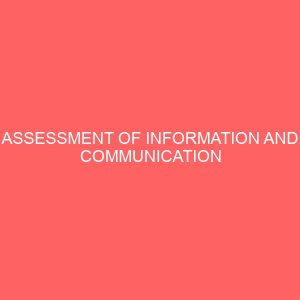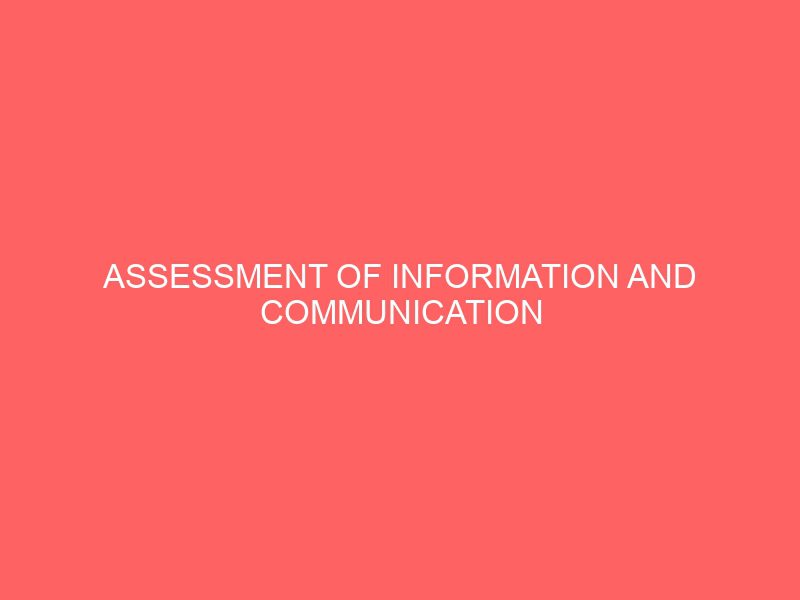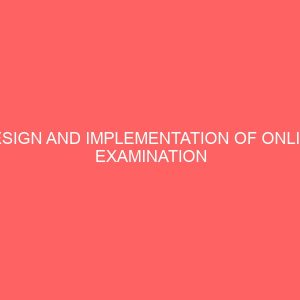Description
ABSTRACT
This study investigated the ICT proficiency level of computer science teachers in Government owned secondary schools in Agbani Education Zone of Enugu state. The research was guided by four research questions and three hypotheses. Survey research design was adopted. Population of 39 computer science teachers, which is the total number of computer science teachers found within the 46 government owned secondary schools were studied. Two instruments were used and these were: A 67item Teachers Self Assessment Form TSAF and an ICT practical skill Achievement Test IPSAT. Results were analyzed using percentages, mean, standard deviation, t and z Test for unrelated/ Independent samples. The results from the data analyzed revealed that; these computer science teachers possess skills only in Microsoft word, World wide web and Window explorers, in other words they possess only three ICT skills out of the seven ICT skills tested. The ICT proficiency level of these computer science teachers is low. These computer science teachers apply ICT to a low extent in teaching and learning in their classroom. The male computer science teachers possess more ICT skills than the female computer science teachers. The ICT skills these computer science teachers claim they possessed were far below what they actually possessed. Gender had nothing to do with the proficiency level of these computer science teachers. This is because there was no significant difference in the ICT proficiency of the male and female computer science teachers. The educational implications were pointed out and the following recommendations among others were made: State, Federal Government and Education policy makers should devise, as well as adopt a viable curriculum that will guarantee the production of highly skilled and professional computer science teachers. Computer science teachers already in the field, should have a compulsory monthly and annual ICT training and retraining workshop organized for them.
TABLE OF CONTENTS
TITLE PAGE I
CERTIFICATION II
APPROVAL PAGE III
DEDICATION IV
ACKNOWLEDGEMENTS V
TABLE OF CONTENTS VII
LIST OF TABLES X
LIST OF APPENDICES XI
ABSTRACT X
CHAPTER ONE: INTRODUCTION 1
Background to the Study 1
Statement of the Problem 9
Purpose of the Study 10
Significance of the Study 10
Scope of the Study 12
Research Questions 13 Research Hypotheses 13
CHAPTER TWO: REVIEW OF RELATED LITERATURE 15
Conceptual Framework 16
Concept of ICT. 16
ICT Proficiency, ICT Literacy, ICT Capacity 18 vii
ICT Proficiency Level 20
Computer Science Teacher 31
Theoretical Framework. 33
Robert Gagnes Condition of Learning. 33
Posners Theory of Psychomotor Skill. 35
Simpsons Psychomotor Domain 40
Banduras Theory of Social Cognitive 44
Theoretical Studies 46
Differences between IT and ICT 46
Differences Between ICT and ICTs 49
Relationship between Gender sex and Performances 51
Empirical Studies 52
ICT Proficiency of Students 52
Proficiency in Mathematics 55
ICT Proficiency of Computer Science teachers in other countries 57
Summary of Reviewed Literature 58
CHAPTER THREE: METHOD 60
Research Design 60
Area of the Study 60
Population of the Study 61
Sample and Sampling Techniques 61
Instrument for Data Collection 61 viii
Validation of the Instrument 63
Reliability of the Instrument 63
Method of Data Collection 64
Method of Data Analysis 65
CHAPTER FOUR: PRESENTATION AND ANALYSIS OF DATA 66
Summary of the major findings 80
CHAPTER FIVE: DISCUSSION OF RESULTS,
CONCLUSION AND RECOMMENDATIONS 82
Discussion of Results 82
Conclusion 88
Implications of the Study 89
Recommendations 91
Limitations of the Study 92
Suggestion Further Research 92
Summary of the Study 93
REFERENCES 98
APPENDICES 105








Reviews
There are no reviews yet.